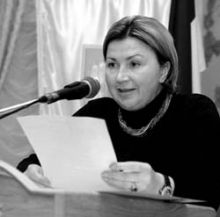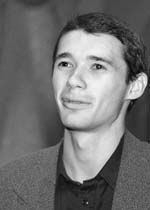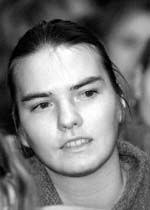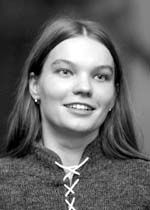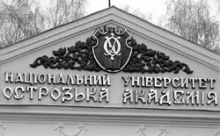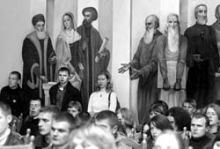As earlier reported, The Day and Kamyanets-Podilsky University held a joint project on the Ostroh Academy campus, including a public lecture delivered by Prof. Valery Stepankov, of Kamyanets-Podilsky, on the 1648- 76 Ukrainian national-liberation revolution (The Day will carry its text in one of the nearest issues). This was evidence that the tradition of public lectures was being revived in Ukraine. During that project, Larysa Ivshyna, Editor-in-Chief of Den’/The Day, declared the institution of a nominal editorial scholarship and the commencement of a scholarship contest. This resolution was seconded by the newspaper’s journalists. One of the contest conditions reads that the scholarship would be conferred on those capable of formulating and defending their views (including such views expressed on newspaper pages). At the Ostroh Academy we saw young people capable of doing precisely that. Although they can vie for other grants and scholarships, Den’/The Day’s editorial scholarship served as a precedent (according to Ostroh Academy Rector Ihor Pasichnyk). It was the first scholarship offered not only for academic merits, but also — and primarily — for public activity. After the lecture, academy students made the most of the opportunity to communicate with noted historians and the Editor-in-Chief of Den’/The Day. This time there seemed even more questions posed, as the students had had time enough to acquaint themselves with Den’/The Day’s Library series: Ukrayina Incognita and Dvi Rusi . Should Rector Ihor Pasichnyk allow everyone wishing to take the floor speak his/her mind, The Day’s visitors would most likely have to spend another couple of days in Ostroh (the meeting was attended by several hundred students). Yet even those questions that were posed and answered sufficed to infer that Ostroh Academy students had long chosen their country, and that now they were mainly concerned with transferring knowledge about it (e.g., historical and modern realities) from the status of private ownership, on the part of separate individuals, to that of public domain. This time we offer our readers what we believe were the most interesting aspects of Editor-in-Chief Larysa Ivshyna’s dialog with the students.
ON THE HAZARDS OF IDEALISM
Oleh FURMANCHUK, third year law student:
Ukrayina Incognita describes Central Rada politicians as idealists. Don’t you think that being presented as idealists could belittle their contribution in the state-building process of Ukraine, in the eyes of the current generation? After all, we are faced with the threat of certain stereotypes setting in; idealists are people generally believed to trust many things but doing little anyway; by the same token, one might develop a somewhat negative attitude toward such Central Rada figures.
IVSHYNA: A young country always tends to add color to what is believed to be authentically national. At present, we want to make all of “our people” look more attractive. It’s probably good at the instinctive level. On the other hand, one must grow up to develop a calm and realistic attitude to what is going on, to see what’s happening for what it actually is. I think that the Central Rada could serve as a very important example of what modern politicians should and shouldn’t do, ever. It’s important for people today to assess things done by historical personalities from the standpoint of current needs, current state-building process. There are so many eloquent politicians causing irreparable damage — we could describe them as idealists, following in the footsteps of the Narodniks [members of a secret Russian political movement, active from 1873 to 1876 before its suppression by the czarist authorities; Narodniks were largely university students, and their main purpose was to convert the peasantry to socialism — Ed.]. Hard facts, however, show that Viktor Chernomyrdin was perfectly right when he said, “We wanted to make it better, but it turned out the usual way.” Also, that such things happen not only in neighboring countries. We have this happening at a certain recurrence rate in Ukraine. I heard Prof. Valery Stepankov’s lecture, particularly what he had to say on the Ukrainian national liberation revolution of 1648-76. While listening to him, I found it hard to hold my emotions in check. He was zeroing in on blunders being made by our current politicians. Except that now idealism is not the only point in question. We have examples from which we can learn not to repeat past mistakes, yet few if any seem determined to do so. And the whole thing is known under a somewhat different name. Therefore, I think that what came to be in history, resulting from intentions born of pure soul, has remained the same to this day. Also, there were things resulting from ignorance, such things must be revised, and we must make all the required inferences, we shouldn’t be afraid to do so.
SWISS COWS AND MAIDEN’S TEARS
Halyna KOKHAN, political science student:
What do you think causes the spiritual crisis in Ukraine at this stage?
IVSHYNA: I think that one ought to ponder this topic very seriously for one’s own benefit. For example, we have an elite in Ukraine, people operating in a variety of spheres, reaching all possible summits and serving as the best possible examples; people being in high demand in the media market. We badly need all of them. Then why don’t we see them on our home screens? How come no one has constantly heard and seen the philosopher Serhiy Krymsky (although he has appeared now and then, in some shows and programs)? I mean hearing him on the scope he actually deserves. The same is true of many other gifted intellectuals, people that could help us understand what is actually happening and warn us against making bad mistakes.
I tend to believe that Ukraine has an elite but lacks the kind of infrastructure that could help such people fill in the niches they deserve. This includes the political domain. Ukraine has an unbalanced social organism. I am convinced that this is the result, and simultaneously evidence, of our spiritual crisis. Consider a simple example. I returned from Switzerland, not so long ago. In that country, I watched a television program on one of the central Swiss channels (that country is regarded as agrarian-oriented, but its people are so rich they don’t seem to know what to do with their money). Guess what that program was about. Cows. It also highlighted people tending them, showing how they are respected in society, also showing how they feed their cows and with what. The program ended showing a cow tender. A good pedigree cow sold for about as much as a modern car. And so people living in that agrarian country prefer to watch a television program about cows, rather than Maiden’s Tears. Why? Perhaps because they understand that what they are watching is precisely that which keeps their country ticking; it’s their way of life. Not only the world-famous Swiss cheeses, but also other products, among them ones produced by their cows; not only bankers (of course, they have them), but also other people keeping their economy alive, among them people breeding cows. Their attention to this topic shows the presence of priorities, it’s another sign of spirituality.
I can understand people in Ukraine missing Maiden’s Tears or other such programs — this country presumably won’t know what to do the next morning unless it watches a program like that. Anyway, this is the impression you get. A parallel world has been created. The Ukrainian’s communication needs haven’t been satisfied for so many years; this Ukrainian cannot find answers to his or her most acute questions. I have mentioned this previously, but we are faced with a paradoxical picture. At a time when the information technologies had reached their peak, the door-to-door method of conveying truthful information and sharing ideas was getting increasingly popular and effective. Personally I see this gap in the information system as another evidence of violating the spiritual sphere of this society. We all know that an adequate and effective system of communication is vitally important [in any country]. Now that we have such clots obstructing blood flow in a social organism, when we lack exchanges of ideas (when, for example, we have to travel to Ostroh to discover that the academy’s teaching staff boasts scholars of this caliber), can we consider this situation normal? Can a young national state afford the luxury of leaving its most learned citizens in the dark? This is the smallest part of the problem. We could spend hours discussing it, but now we are on a topic I find most captivating, mass communications.
ARCHITECTURE AND ARCHICYNICISM
Tetyana POPOVA, fourth year foreign philology student:
Why do you attach such importance to architecture in your two-volume collection of historical sketches?
IVSHYNA: It’s a very important issue for us. I visited St. Petersburg once (it was known as Leningrad at the time) and I became aware of the importance those people attached to their architecture. A noted sociologist told me later that when they studied the level of development [and IQ] of children, comparing it to the place of their birth and where they had reached maturity, they discovered sharp deviations in children born and raised in historical and modern residential districts (except the countryside, where the situation is markedly different). It transpired that children born in historical places are better at digesting information and are more aesthetically advanced. Of course, this doesn’t mean that we can’t bridge the gap, yet its presence was clearly defined.
I am also convinced that all of us realize the importance of the surviving architectural sites in Ukraine; such places, what’s left of the structures, are the invaluable proof of our past attainments, our spirituality, and at the same time a grave warning. Once, when no one thought of replanning Independence Square, it being the Ukrainian capital’s key public place, I wrote a little feature for Den’/The Day. It was titled “Bez Pafosu” [Free of Pomp]. My message was that no one should build anything downtown before carefully pondering all the pros and cons. After all, everything this country has suffered over the centuries is very much like shell shocks. Few people sustaining them are known to have fully recovered, meaning that few are fully aware of what’s actually happening and can generate new ideas. This afflicted organism needs time to recover from its illness. New beautiful architectural ensembles don’t often appear at such times. Yet architecture is a world outlook, meaning that what we have witnessed being erected in Kyiv over the past several years, and regarded as a cultural disaster, is anything but coincidental. Could anyone have pictured a keep-fit center and swimming pool being built by the walls of St. Sophia’s Cathedral? If we cannot feel pained at heart watching this outrage, it means that we are dead even though remaining alive. And so one had to give an impetus to a campaign of protest. We are alive, aren’t we? And I mean not only St. Sophia’s. I know that Larysa Skoryk instructed her architecture students to prepare layouts of Independence Square, the way they saw it in the future. I know that some will frown at this, saying what the hell, we’ve just built it and now they are saying we must tear all this down. It’s not the point. What I mean is that there is cynicism and there is archicynicism. First they wanted a Museum of Ukrainian State Building on Independence Square, then ended with a large shopping mall. In other words, it was done so that the credulous would finally shake their heads, saying oh, well, we’ll have a Museum of Ukrainian State Building, whatever it looks like. Wrong! We must not accept handouts if we can have everything on the table, especially in our own country. We will then never have situations such as this one. Indeed, people coming from remote Ukrainian regions and ogling such window displays in downtown Kyiv will tell themselves something like see, we’re getting civilized, it’s almost like in the West... For my part I regard this as a slap in the face of not only the residents of Kyiv, but also many other people living elsewhere in Ukraine and believing that the Kyiv downtown construction project (done without any formally approved blueprints, by the way) would produce the Museum of Ukrainian State Building, as promised. Instead, they opened a shopping center... You see, we live at a time when fortunes are easily made, sending heads spinning; we must live through all this, even if we have to sustain maximum losses. I believe that, with the chief architect of Kyiv being replaced, this abominable process will stop. But they have chopped down parks and maimed St. Volodymyr Hill! And we all know that the Kyiv landscape is a historic treasure in itself. I might as well point out that few other countries have the kind of cityscapes we do. Yet we must learn to see and admire them. That’s why we allocate such space for architecture in our articles and books. Architecture means world outlook and spirituality put together.
POST FACTUM
Natalia DUBASIUK, fifth year humanities student:
I’ve never felt in an atmosphere of such freedom and sincerity before meeting Mrs. Ivshyna, not even at parties with friends. We are grateful for her visiting our Ostroh Academy again and hope to see her again before long. I would also like to thank the Editor-in- Chief of Den’/The Day for arranging our meeting with Prof. Valery Stepankov. It’s true that our national history has many blank spots, meaning that such people in Ukraine are worth their weight in gold. Our students, yours truly among them, crave such knowledge and hope that such public lecture will fill in such historical gaps. Thanks in advance for your next visit. We’ll be thrilled to find out who has won the scholarship contest granted by the Editor-in-Chief of Den’/The Day.
Olena HAVRYLEVYCH , second year law student:
It’s gratifying to know that there are Ukrainian [printed] media worthy of their readers’ confidence, that such periodicals can show you the right life path to embark upon. I can only hope that there will be more personalities, such as Larysa Ivshyna, and creative teams matching Den’/The Day’s staff. This newspaper is tangibly contributing in the formation and development of the Ukrainian elite, mature Ukrainian political thought, as well as in the construction and upgrading of information technologies. Honestly, I admire your performance.
Ruslana KALAMAZH, Assistant Rector, Ostroh Academy:
Just as we were hearing and watching all those telling us that our young people were passive, that they didn’t give a damn about politics and lacked civic stands, we met with Larysa Ivshyna and saw her establish a nominal scholarship, giving an example for the younger generation, encouraging them to take a closer look at various aspects of life in Ukraine, voice their opinions, and receive an additional bonus in satisfying their sociogenic needs, being aware that their ideas would be heard and accepted.
The Ostroh Academy students were excited to learn about Den’/The Day Editor’s scholarship. Even students abroad, under various international exchange programs, were quick to respond. One of them, Alina Zakharchuk, currently on a nine-month on-the-job journalist training course in the United States, wrote that she would never miss an opportunity to have her article carried by her favorite newspaper.
In a word, Larysa Ivshyna deserves every praise for her skill at detecting talent, what with her extraordinary experience as a journalist and capable administrator. Somehow I am convinced that many Ostroh Academy students will find their path to self-assertion divided into two stages, before and after meeting Larysa Ivshyna.
Lina OSTAPCHUK, fourth year philology student:
I like the idea of holding a contest to receive Den’/The Day Editor’s scholarship. We are interested in journalism and we write features for our Ostroh Academy’s newspaper. We would also like to cooperate with your periodical.
Halyna KOKHAN, political science student:
I enjoyed Prof. Valery Stepankov’s lecture and what Mrs. Ivshyna had to say. The lecture turned out an account of a man’s stand, rather than a dry academic account; it reflected first-hand experiences corroborated by historical facts. When listening to the Editor-in-Chief of Den’/The Day, I could tell that she knew all there was to know about Ukrainian political and daily life; she was keeping a sensitive finger on the pulse of our country. As for the scholarship, I will, of course vie in the contest, writing and submitting articles to The Day. We’ll see what we’ll see. Scholarship is a strong stimulus, of course, for we students know what having or lacking money is all about.

